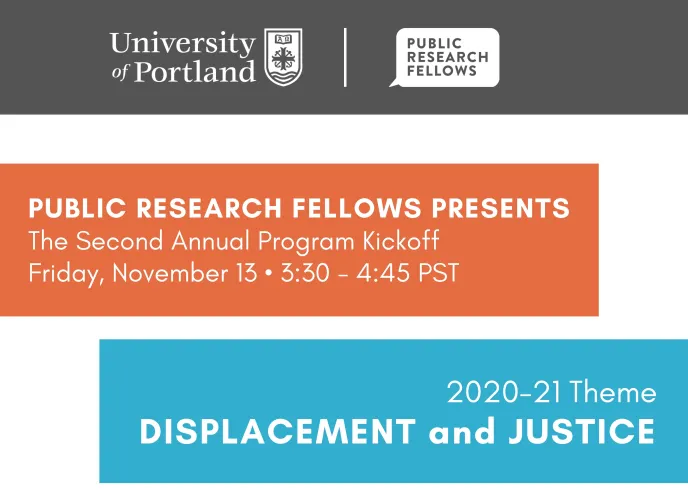Displaced Justice / Justice Displaced

“Belonging, home, land, celebration, and care.” These were the responses community leaders shared to answer the opening question—What does community mean to you?—at the University of Portland’s roundtable discussion on “Displacement and (In)Justice in Portland.” The roundtable discussion was part of the university’s Public Research Fellowship Program (PRF) event series on the annual theme “Displacement and Justice” that I have been curating since Fall 2020. The event brought together members of the university as well as the general public in an effort to engage with the annual theme beyond the bounds of our campus. The PRF was founded on the belief that the humanities should play a vital role in responding to the challenges faced by universities and our communities. It provides structure and support for the development of collaborative faculty-student research projects inspired by an annual theme.
In bringing together community leaders who have been displaced and/or work with communities that have been displaced, the roundtable discussion critically examined Portland’s ‘Politics of Displacement,’ which has a long and violent history. The panelists included Alyssa Macy, a citizen of the Confederated Tribes of Warm Springs (OR) who most recently served her Nation as the Chief Operations Officer; Lisha Shrestha, a doctoral candidate at the School of Social Work at Portland State University, a migrant woman, and the Executive Director of the Division Midway Alliance; Cameron Herrington, who manages the anti-displacement program for the Living Cully coalition—a partnership of four community development organizations; Tsering Sherpa, who leads the multicultural programming work at the Rosewood Initiative and is also a graduate student at the University of Portland; and Vania Lucio-Mancilla, the Multnomah County Organizer for Unite Oregon who has extensive experience in grassroots organizing for immigrant rights and housing.
Prompted by several co-curated questions, the panelists spoke to aspects of power, trauma, and socio-cultural capital in exploring experiences with and of displacement. While the conversation started with a question on the meaning of community, the panelists also shared how displacement has impacted their lives and/or the lives of the communities they serve. In this context, experiences of refugees, who have been displaced multiple times, were emphasized, forming what can be conceived of as a displacement continuum: from displacement in their countries of origin, to displacement during flight, and then again in host countries.
As we learned about these experiences, questions of justice were prevalent. Arguably, and as I hold, displacement—the act of being forcibly (re)moved from a place of habitual residence—is inherently a matter of justice, or more so injustice. The act of displacement transcends various intersecting spaces of loss: loss of home, loss of rights, loss of livelihood, loss of land, loss of identity... Conceptualizing displacement in relation to justice offers a mode of understanding and addressing these losses.
Displaced justice/justice displaced—as mutually reinforcing dynamics—then has to do with the intricate relationship of loss and being forcibly (re)moved and detached from claims of justice while operating and living in inherently unjust conditions. The injustices experienced by displaced communities are pervasive. Indeed, they are omnipresent as community leaders explored in detail in our conversation on how they and their organizations have prevented and addressed displacement, and what role local partnerships, including with the university, might play in this.
As members of the University of Portland carefully listened to suggestions for partnerships in addressing and preventing displacement, it became clear that publicly engaged humanities initiatives and practices have a critical role to play in community engagement. This role, however, must break free from conventional forms of engagement in which higher education institutions impose research agendas and preconceived notions of needs onto communities. According to Cameron Herrington, there is tremendous potential in “bringing the university to the community to build knowledge together,” but that relationship is “most productive when you define the needs with the community, rather than beforehand.” Alyssa Macy echoed this idea, emphasizing that “you need to get to know us and be in relationship with us before you come to the table.”
To ensure that these and other recommendations made regarding community-based/engaged public humanities initiatives are considered as we move forward with the PRF, we have restructured the program and now have a community-engagement coordinator role that I will be leading.
In the meantime, this year’s PRF projects truly showcased what was discussed during the community roundtable including an interactive StoryMap on the connection between spaces and experiences of Black displacement in Portland, “Narratives through Music”—a full-length concert that features songs that tell stories about how a longing for home affects people in different ways, a virtual living newspaper on the pressing question of Where is Home?, as well as a podcast about the experiences of FGEN students. It is these creative and innovative projects, consisting of teams of faculty and students, that demonstrate the opportunities of publicly engaged humanities initiatives and the importance of community-based engagement therein.
Dr. Lara-Zuzan Golesorkhi is an Assistant Professor of Political Science and Global Affairs / Gender, Women, and Sexuality Studies at the University of Portland. As a scholar, educator, activist, and migrant woman, Lara-Zuzan's work is concerned with migration-gender relations in a global context. Lara-Zuzan is the Founder and Executive Director of the Center for Migration, Gender, and Justice.